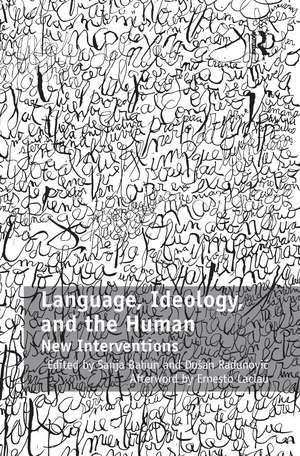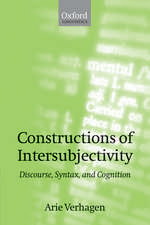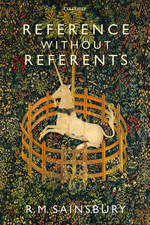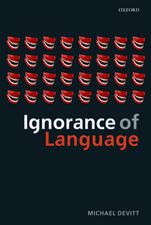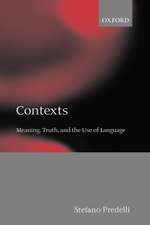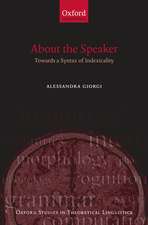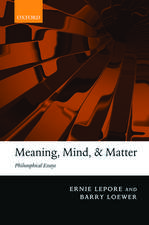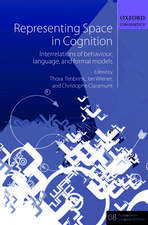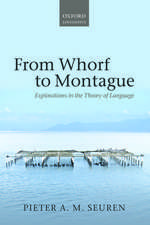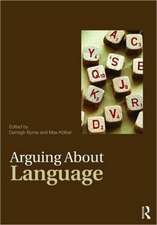Language, Ideology, and the Human: New Interventions
Editat de Dusan Radunović, Sanja Bahunen Limba Engleză Paperback – 24 mai 2017
| Toate formatele și edițiile | Preț | Express |
|---|---|---|
| Paperback (1) | 416.22 lei 6-8 săpt. | |
| Taylor & Francis – 24 mai 2017 | 416.22 lei 6-8 săpt. | |
| Hardback (1) | 1060.25 lei 6-8 săpt. | |
| Taylor & Francis – 13 noi 2012 | 1060.25 lei 6-8 săpt. |
Preț: 416.22 lei
Nou
Puncte Express: 624
Preț estimativ în valută:
79.64€ • 83.36$ • 66.29£
79.64€ • 83.36$ • 66.29£
Carte tipărită la comandă
Livrare economică 31 martie-14 aprilie
Preluare comenzi: 021 569.72.76
Specificații
ISBN-13: 9781138108424
ISBN-10: 1138108421
Pagini: 272
Dimensiuni: 156 x 234 mm
Greutate: 0.45 kg
Ediția:1
Editura: Taylor & Francis
Colecția Routledge
Locul publicării:Oxford, United Kingdom
ISBN-10: 1138108421
Pagini: 272
Dimensiuni: 156 x 234 mm
Greutate: 0.45 kg
Ediția:1
Editura: Taylor & Francis
Colecția Routledge
Locul publicării:Oxford, United Kingdom
Notă biografică
Sanja Bahun is Senior Lecturer in the Department of Literature, Film, and Theatre Studies at the University of Essex, UK. She is the author of Modernism and Melancholia: Writing as Countermourning, and co-editor of The Avant-garde and the Margin: New Territories of Modernism; Violence and Gender in the Globalized World: The Intimate and the Extimate; From Word to Canvas: Appropriations of Myth in Women's Aesthetic Production; and Myth and Violence in the Contemporary Female Text: New Cassandras.
Dušan Radunović is Lecturer in Russian at the School of Modern Languages and Cultures, Durham University, UK, and author of The Early Thought of Mikhail Bakhtin.
Dušan Radunović is Lecturer in Russian at the School of Modern Languages and Cultures, Durham University, UK, and author of The Early Thought of Mikhail Bakhtin.
Recenzii
'Bahun and Radunović have put together an exciting and stimulating volume, which tackles the complex question of how language and our humanity intersect from an extraordinary range of positions. The essays are provocative and exploratory and they range from discussions of constitution-making and cosmopolitanism to analyses of Helen Keller and Cain and Abel. An important contribution to current debates.’ - Ken Hirschkop, University of Waterloo, Canada
‘By examining the intricate connections between language and ideology and by investigating the place of language as ideology, Language, Ideology, and the Human artfully brings together a wide-ranging field of disciplines: from philosophy to philology, linguistics, political science, psychoanalysis and cultural studies. The invigorating analyses and the refreshing perspectives that it offers are bound to make it an indispensable text.’ - Marinos Pourgouris, University of Cyprus, Cyprus
‘This is a well-rounded collection that will appeal to both Humanities and Social Sciences. It does not merely take part in the debate on language and ideology but goes some way in setting the agenda as well.’ - Angie Voela, University of East London, UK
‘By examining the intricate connections between language and ideology and by investigating the place of language as ideology, Language, Ideology, and the Human artfully brings together a wide-ranging field of disciplines: from philosophy to philology, linguistics, political science, psychoanalysis and cultural studies. The invigorating analyses and the refreshing perspectives that it offers are bound to make it an indispensable text.’ - Marinos Pourgouris, University of Cyprus, Cyprus
‘This is a well-rounded collection that will appeal to both Humanities and Social Sciences. It does not merely take part in the debate on language and ideology but goes some way in setting the agenda as well.’ - Angie Voela, University of East London, UK
Cuprins
List of Figures, Notes on Editors, Notes on Contributors, Acknowledgments, Introduction: Introducing, Intervening, and Introspecting PART I Revisiting, PART II In the World, Prospecting, Afterword: Language, Discourse, and Rhetoric, Index
Descriere
Language, Ideology, and the Human: New Interventions redefines the critical picture of language as a system of signs and ideological tropes inextricably linked to human existence. Offering reflections on the status, discursive possibilities, and political, ideological and practical uses of oral or written word in both contemporary society and the work of previous thinkers, this book traverses South African courts, British clinics, language schools in East Timor, prison cells, cinemas, literary criticism textbooks and philosophical treatises in order to forge a new, diversified perspective on language, ideology, and what it means to be human.
